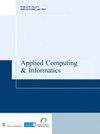IDMPF: intelligent diabetes mellitus prediction framework using machine learning
IF 4.9
Q1 COMPUTER SCIENCE, INFORMATION SYSTEMS
引用次数: 10
Abstract
PurposeMachine Learning is an intelligent methodology used for prediction and has shown promising results in predictive classifications. One of the critical areas in which machine learning can save lives is diabetes prediction. Diabetes is a chronic disease and one of the 10 causes of death worldwide. It is expected that the total number of diabetes will be 700 million in 2045; a 51.18% increase compared to 2019. These are alarming figures, and therefore, it becomes an emergency to provide an accurate diabetes prediction.Design/methodology/approachHealth professionals and stakeholders are striving for classification models to support prognosis of diabetes and formulate strategies for prevention. The authors conduct literature review of machine models and propose an intelligent framework for diabetes prediction.FindingsThe authors provide critical analysis of machine learning models, propose and evaluate an intelligent machine learning-based architecture for diabetes prediction. The authors implement and evaluate the decision tree (DT)-based random forest (RF) and support vector machine (SVM) learning models for diabetes prediction as the mostly used approaches in the literature using our framework.Originality/valueThis paper provides novel intelligent diabetes mellitus prediction framework (IDMPF) using machine learning. The framework is the result of a critical examination of prediction models in the literature and their application to diabetes. The authors identify the training methodologies, models evaluation strategies, the challenges in diabetes prediction and propose solutions within the framework. The research results can be used by health professionals, stakeholders, students and researchers working in the diabetes prediction area.IDMPF:基于机器学习的智能糖尿病预测框架
机器学习是一种用于预测的智能方法,并在预测分类中显示出有希望的结果。机器学习可以拯救生命的关键领域之一是糖尿病预测。糖尿病是一种慢性疾病,也是全球十大死因之一。预计到2045年,糖尿病患者总数将达到7亿;与2019年相比增长了51.18%。这些都是令人担忧的数字,因此,提供准确的糖尿病预测成为当务之急。设计/方法/方法卫生专业人员和利益相关者正在努力建立分类模型,以支持糖尿病的预后和制定预防策略。作者对机器模型进行了文献综述,并提出了糖尿病预测的智能框架。作者对机器学习模型进行了批判性分析,提出并评估了一种基于智能机器学习的糖尿病预测架构。作者使用我们的框架实现并评估了基于决策树(DT)的随机森林(RF)和支持向量机(SVM)学习模型作为文献中最常用的糖尿病预测方法。本文提出了一种基于机器学习的糖尿病智能预测框架(IDMPF)。该框架是对文献中的预测模型及其在糖尿病中的应用进行批判性检查的结果。作者指出了糖尿病预测的训练方法、模型评估策略和挑战,并在框架内提出了解决方案。研究结果可供卫生专业人员、利益相关者、学生和从事糖尿病预测领域的研究人员使用。
本文章由计算机程序翻译,如有差异,请以英文原文为准。
求助全文
约1分钟内获得全文
求助全文
来源期刊

Applied Computing and Informatics
Computer Science-Information Systems
CiteScore
12.20
自引率
0.00%
发文量
0
审稿时长
39 weeks
期刊介绍:
Applied Computing and Informatics aims to be timely in disseminating leading-edge knowledge to researchers, practitioners and academics whose interest is in the latest developments in applied computing and information systems concepts, strategies, practices, tools and technologies. In particular, the journal encourages research studies that have significant contributions to make to the continuous development and improvement of IT practices in the Kingdom of Saudi Arabia and other countries. By doing so, the journal attempts to bridge the gap between the academic and industrial community, and therefore, welcomes theoretically grounded, methodologically sound research studies that address various IT-related problems and innovations of an applied nature. The journal will serve as a forum for practitioners, researchers, managers and IT policy makers to share their knowledge and experience in the design, development, implementation, management and evaluation of various IT applications. Contributions may deal with, but are not limited to: • Internet and E-Commerce Architecture, Infrastructure, Models, Deployment Strategies and Methodologies. • E-Business and E-Government Adoption. • Mobile Commerce and their Applications. • Applied Telecommunication Networks. • Software Engineering Approaches, Methodologies, Techniques, and Tools. • Applied Data Mining and Warehousing. • Information Strategic Planning and Recourse Management. • Applied Wireless Computing. • Enterprise Resource Planning Systems. • IT Education. • Societal, Cultural, and Ethical Issues of IT. • Policy, Legal and Global Issues of IT. • Enterprise Database Technology.
 求助内容:
求助内容: 应助结果提醒方式:
应助结果提醒方式:


